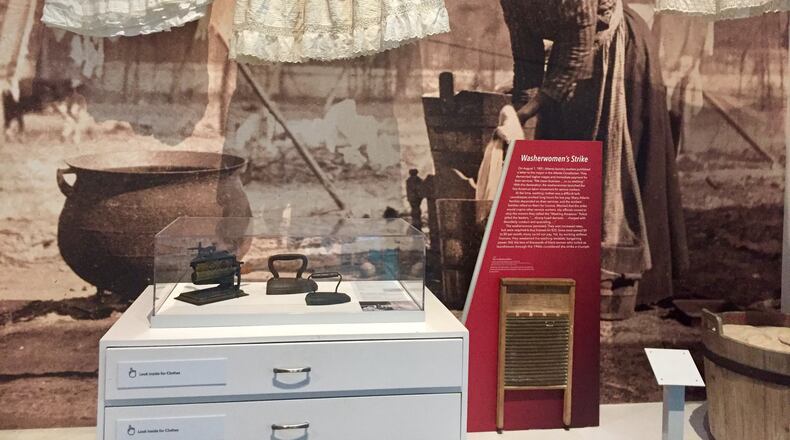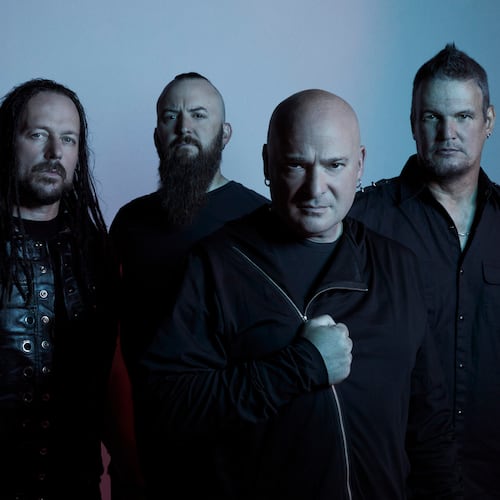In 2017, playwright Kelundra Smith first learned about the Atlanta 1881 Washerwomen’s Strike by way of a small panel in an enormous, centuries-spanning exhibit at the National Museum of African American History and Culture in Washington, D.C. — more than 600 miles and 130 years from where and when the strike took place. At the time, she remembers marveling at how she had never in her life heard of this Reconstruction era David-versus-Goliath labor movement success story, despite having grown up in Georgia, where all eighth graders in public school are mandated to take a state history class.
Credit: Briea Malone
Credit: Briea Malone
“I feel like American history is taught like, there was slavery, and then there was the Civil War, and then there was World War I. There’s a chunk of time in between that’s largely skipped over, but that chunk of time really shaped a lot of what American society is today,” Smith said.
As an arts journalist, Smith had been working on another assignment during that trip to the capital. But she returned with far more than just a scoop — she came back with the seedling of a new kind of story rattling around her brain. The drama of this radically under-told moment was insistently tapping on her shoulder, begging to breathe, to shout, to live.
The movement, which went down weeks before the International Cotton Exposition rolled into town, was significant for a host of reasons. First, it was one of the first successful interracial strikes after the Civil War. Second, it started when 20 Black laundresses who were sick of low pay and poor treatment from their wealthy clients formed a trade organization called the Washing Society. But that smaller group quickly grew into a coalition of 3,000.
And finally, remarkably, despite the daunting challenge of racist and hostile power structures, and the very real and imminent threat of arrest and attacks, these brave women stuck to their guns and eventually gained greater autonomy from the city to set the higher rates they deserved.
Credit: Courtesy of Kelundra Smith
Credit: Courtesy of Kelundra Smith
All of this gets told with immediacy, emotional weight and even moments of humor in Smith’s resulting two-act play, “The Wash,” which will be striding into a week-long workshop from March 28-April 1 at Synchronicity Theatre Company, co-produced by Impact Theatre Atlanta. There will be a public presentation of the workshop at 2:30 p.m. April 1. Previously, “The Wash” was part of the 2022 Essential Theatre Play Festival in August, in a reading produced by Hush Harbor Lab. A full-scale production is coming in summer 2024.
Smith’s play focuses on a crucial core group of women from different backgrounds who wind up leading the charge. Many of these required some creativity in filling in narratives and backgrounds, due to a disheartening lack of information on the actual women themselves. But the details she did unearth — thanks to meticulously combing through research libraries, books, newspaper clippings, and old records — were captivating.
“The more I learned about (the strike), it felt like theater in my mind. Because all I can see in my head are these Black women throwing white people’s dirty clothes into the streets, and I thought about how brave that had to be given the time period,” Smith said.
A couple months after she got back from D.C. in 2017, she remembers driving home and hearing her maternal grandmother’s voice in her head — even though her grandmother died before she was born.
Her mom’s mom was Anna — which Smith turned into the name of one of “The Wash’s” many strong protagonists. As Smith listened to that voice, outlines of scenes began to emerge and take shape. Anna coming down the stairs with a shotgun as protection. Anna counting rice and beans because that’s what the women were having to make do with as their customers continued to skirt around actually paying them for their services.
Smith said she went home and began writing with urgency — “by hand, like a crazy person,” she laughs — dialogue cascading through ink. “By the time I had 34 pages on single space notebook paper, I said, ‘Okay, you’ve got to type this because clearly, there’s something here.’”
Smith stuck with the piece for a couple years, finally turning what she felt to be a solid enough draft to share with others. In early 2020, she assembled some friends to do a table read. Hearing it aloud for the first time, finally, she said, “I think I was surprised that it wasn’t awful.” That reading also showed her where some gaps were — especially the character arcs she needed to complete.
“It also made me decide, is this a play about a labor strike, or is this a play about the women who find themselves in these circumstances, who end up starting a labor strike for the sake of their survival?” Smith said. “And for me, the theater that I like the most is not about events; it’s about people. And so that table read also just made me kind of dig into making sure this is a play about people, not a play about an event.”
In finding those character arcs, Smith could plug into her own family’s history, especially that of her maternal grandmother Anna, who did domestic work for 20 years for a family that owned two mansions on the East Lake Golf Course.
Another character in the play, Thomasine, is modeled after Smith’s paternal grandmother’s story — which struck a poignant note with her dad especially. “My father was very grateful for that because his mother died when he was an infant,” she said. “And so, for him, it was kind of seeing a possibility of what his mother could have been.”
This play is part of a three-part historical undertaking Smith calls The Reconstruction Trilogy, “focused on black achievement in Reconstruction-era Georgia.” The three plays, which include “The Vote” and “The Knot” along with “The Wash,” will concentrate “on what, from my point of view, were areas that Black people focused on post-emancipation, so that would be the family, social mobility and popular sovereignty,” she said.
Meanwhile, the way that Smith balances her somewhat newer playwriting career with her successful career as a journalist and theater critic is something she’s still figuring out. (Smith has done freelance work for The Atlanta Journal-Constitution.) “I know there will come a day when I can’t critique anymore. And that’s fine,” she said. “There will come a day when I am critiqued, and that’s also fine because I’m very aware that the stories I’m telling have never been told in the American theater before. I expect a wide range of responses. I would rather people be having a conversation.”
In addition to the upcoming workshop of “The Wash,” you can see more of Smith’s work later this year. Her forthcoming play, “Other Paths to God,” a dark comedy murder-mystery about nurses during the pandemic, will be produced as part of her work in the inaugural cohort of the New Georgia Woman Project: Black Women Speak, sponsored by Horizon Theatre Company and the National New Play Network.
THEATER PREVIEW
Workshop production of “The Wash”
2:30 p.m. April 1. Free. Synchronicity Theatre, 1545 Peachtree St. NE, #102, Atlanta. 404-484-8636, synchrotheatre.com.
About the Author
Keep Reading
The Latest
Featured





